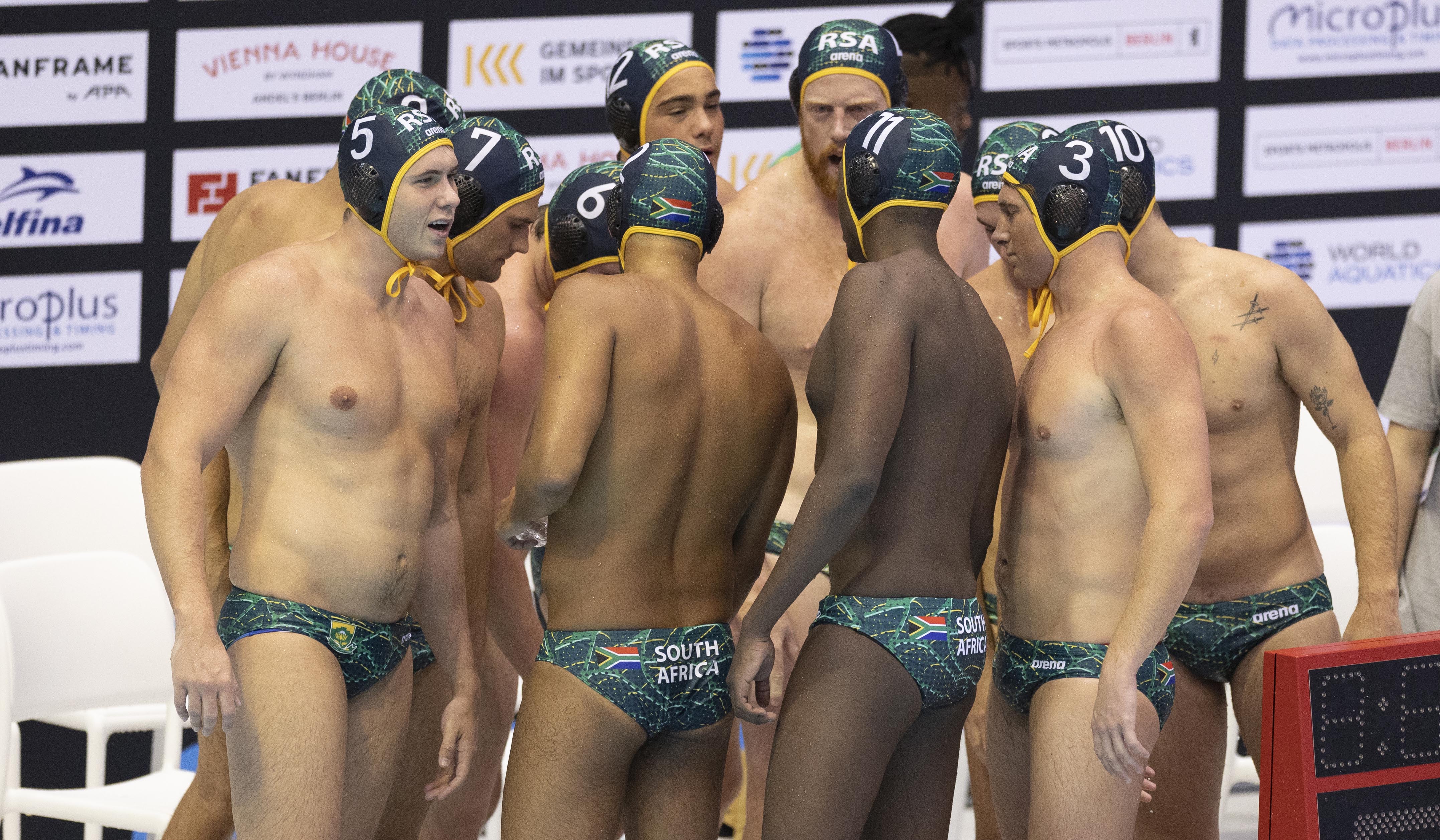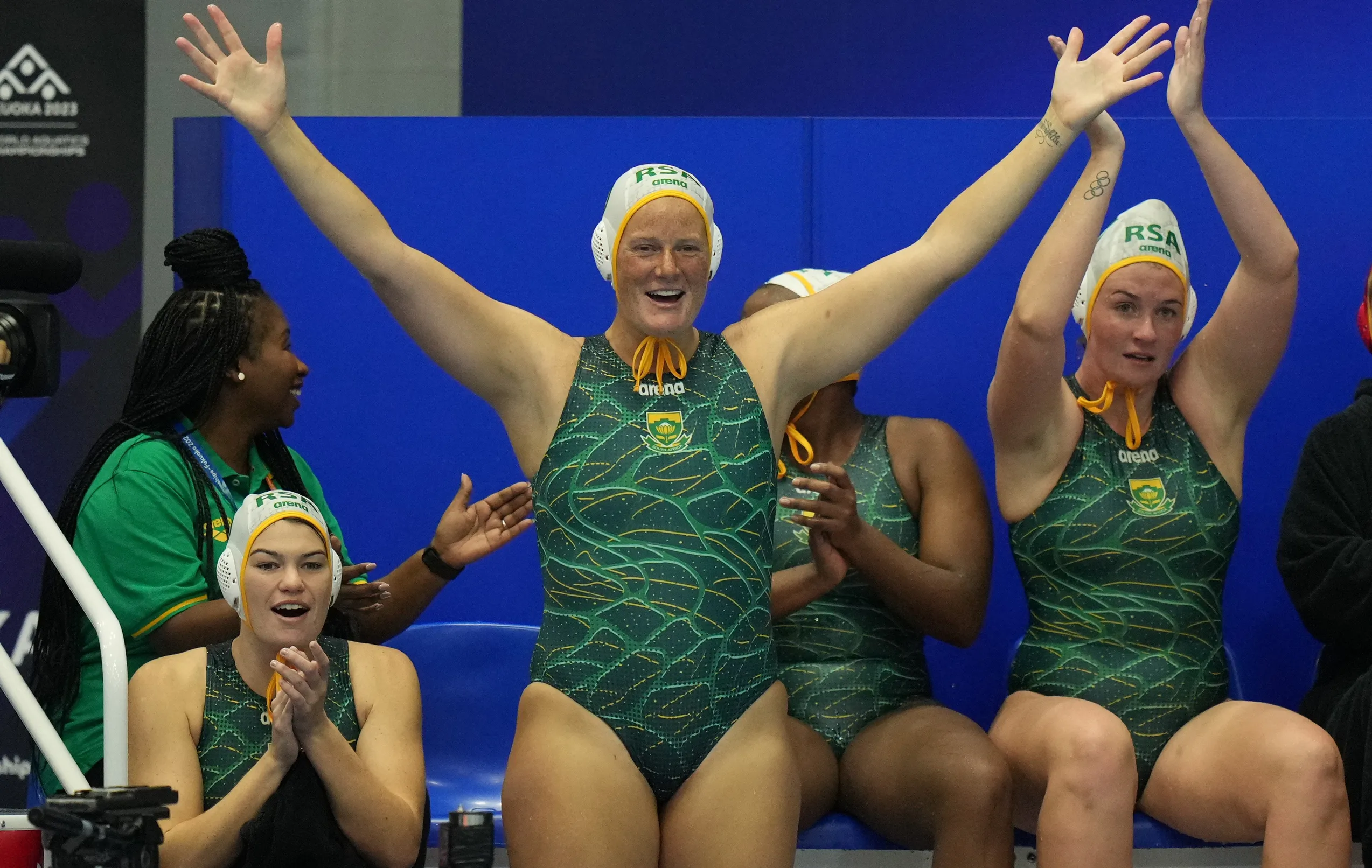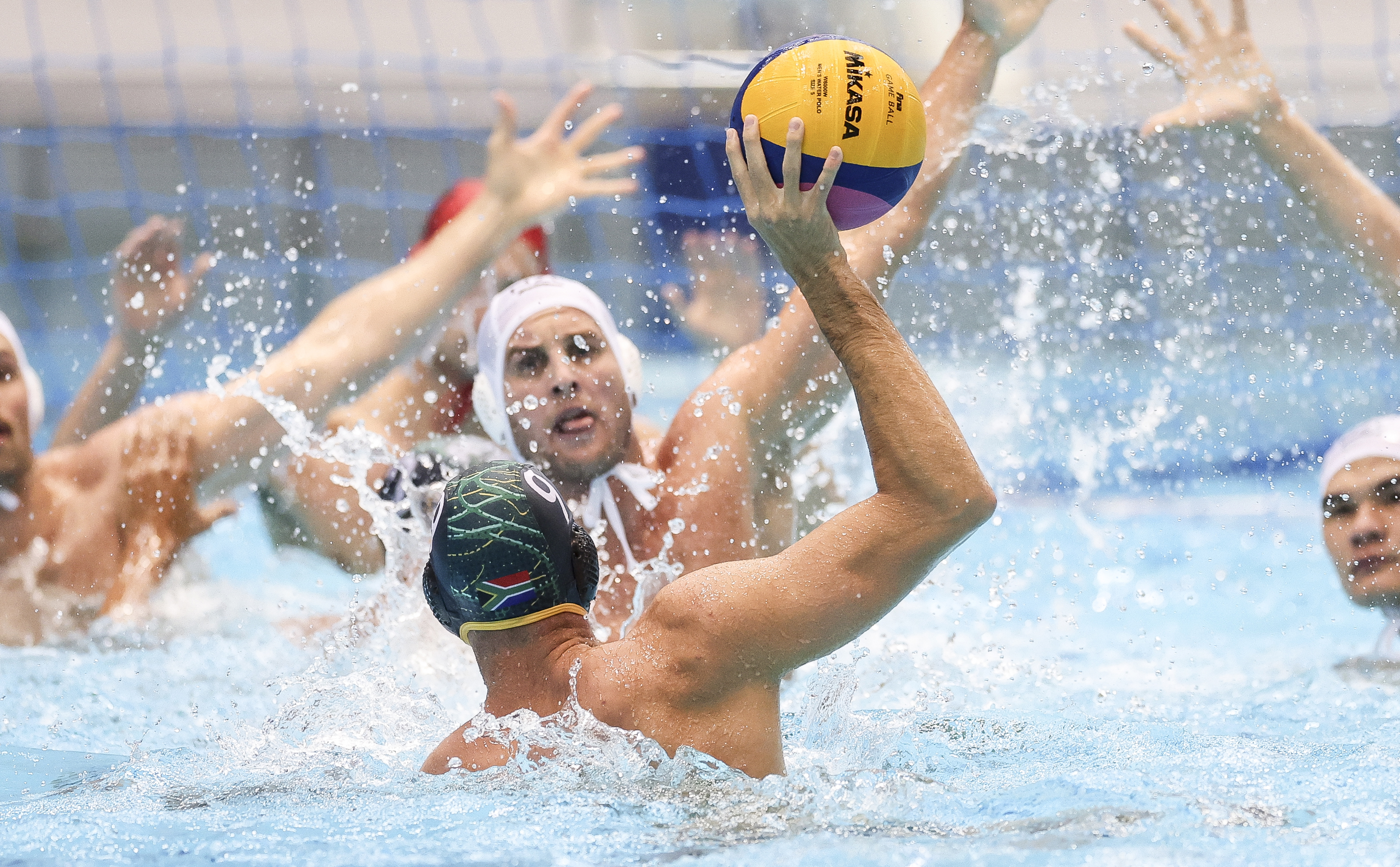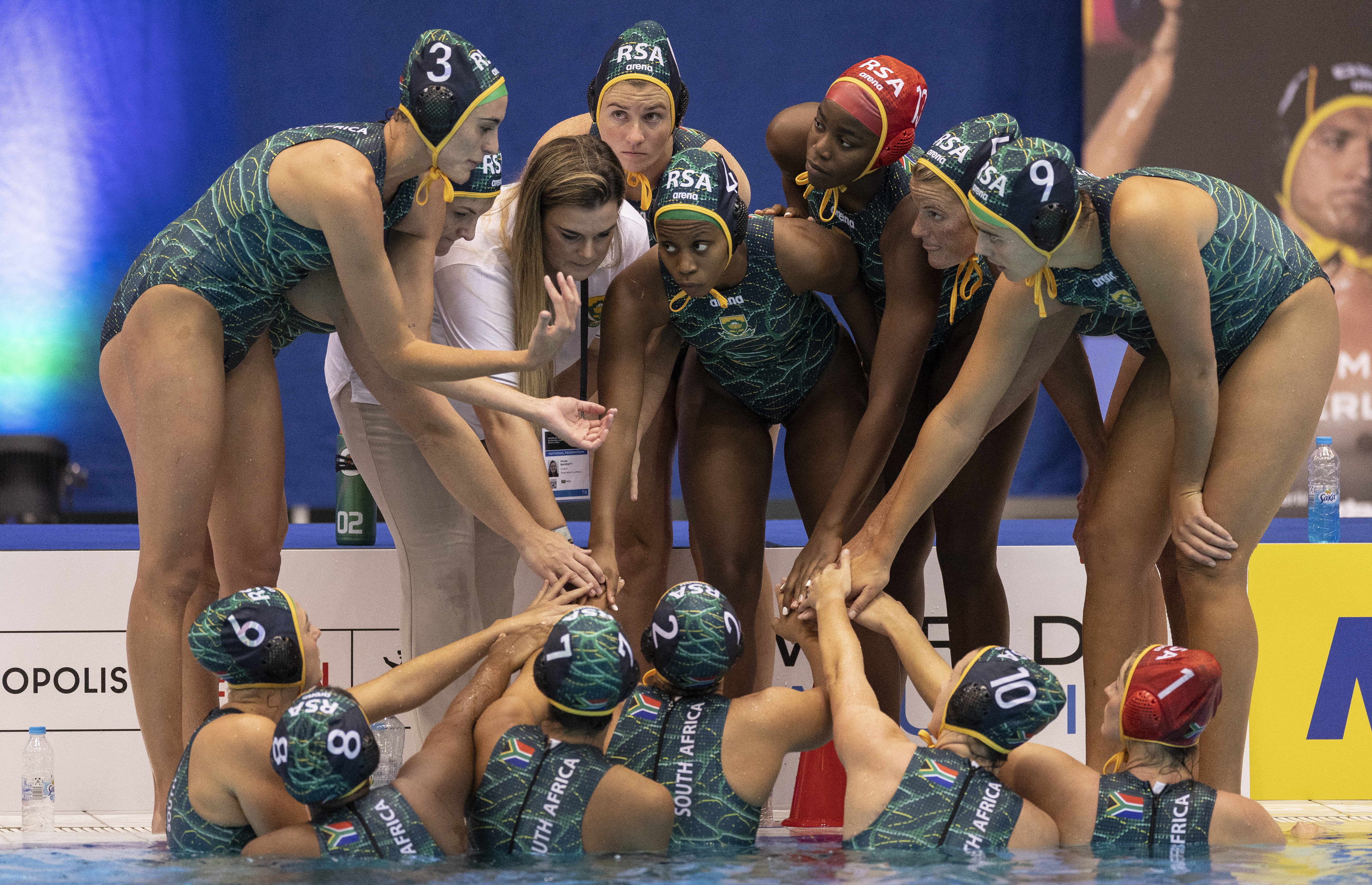South Africa’s elite water polo players were left gobsmacked this week when they learnt they would not be going to the 2024 Olympic Games in Paris.
Swimming South Africa (SSA) has withdrawn both the men’s and women’s water polo teams from the team to Paris because they are not realistic medal contenders. If that is the criteria, then 90% of Team South Africa should not be going to the Olympics.
To make matters worse, the players only heard through social media – and not official channels – that they wouldn’t be going to Paris.
This comes after they received barely any support from SSA in terms of training camps and funding.
SSA made the decision to remove the water polo teams from Olympic consideration due to their performances at the recent World Aquatics Championships in Doha, Qatar, which ended on 18 February.
The women’s team finished 14th out of 16 sides while the men finished 15th.
According to SSA, a minimum 12th place finish was required from both teams for them to consider taking up the continental spot. Instead, Romania and Canada will take the men’s and women’s places at the Olympic Games.
“For us to accept a continental slot, they had to achieve a top-12 ranking [at the World Aquatics Championships in Doha] and they did not achieve a top 12 ranking,” SSA chief executive Shaun Adriaanse told Daily Maverick.
 Players of South Africa huddle during the World Aquatics Men's Water Polo World Cup Division 2 Qualifier preliminary Group B match between China and South Africa at Schwimm- und Sprunghalle im Europa-Sportpark on 5 May 2023 in Berlin, Germany. (Photo: Maja Hitij / Getty Images)
Players of South Africa huddle during the World Aquatics Men's Water Polo World Cup Division 2 Qualifier preliminary Group B match between China and South Africa at Schwimm- und Sprunghalle im Europa-Sportpark on 5 May 2023 in Berlin, Germany. (Photo: Maja Hitij / Getty Images)
Set up to fail
Just what SSA does to help prepare the water polo teams – other than sending out communiqués – is questionable.
One of the national water polo players Daily Maverick spoke to, but who wishes to remain anonymous, said that since the 2023 World Aquatics Championships in Fukuoka, Japan, last July, both teams had only a single training camp. That was in December 2023.
That training camp, held in Gqeberha, doubled up as a selection camp for the World Aquatics Championships which kicked off at the start of February.
The team was announced two weeks ahead of the 2024 Championships and trained together for the first time, for three days, in Johannesburg.
That was the week before the Championships began in Doha.
“The squads were finalised last year so they know more or less who will be in the team. So, I think they had adequate preparation,” Adriaanse said, without elaborating on what that “adequate preparation” entailed.
According to a player, they could not train as a team as all training camps must be approved by SSA before going ahead.
The selected players for the World Champs subsequently had to pay around R20,000 from their own pockets, on short notice, for flights and accommodation in Doha, as the sport remains largely self-funded.
In Doha, Team South Africa shared two physios – one between 10 swimmers and another between both water polo teams, the diving team and the synchronised swimming team (about 50 people).
“It was like being set up to fail,” a national player told Daily Maverick.
 Megan Sileno (L-2) of South Africa reacts after point at the Women's Water Polo crossover matches between South Africa and Canada events during the World Aquatics Championships 2023 in Fukuoka, Japan, 22 July 2023. (Photo: EPA-EFE / HIROSHI YAMAMURA)
Megan Sileno (L-2) of South Africa reacts after point at the Women's Water Polo crossover matches between South Africa and Canada events during the World Aquatics Championships 2023 in Fukuoka, Japan, 22 July 2023. (Photo: EPA-EFE / HIROSHI YAMAMURA)
 Dylan Cronje of South Africa tries to score during the World Aquatics Men's Water Polo World Cup Division 2 Qualifier Final 7th-8th Place Match between New Zealand and South Africa at Schwimm- und Sprunghalle im Europa-Sportpark on 7 May 2023 in Berlin, Germany. (Photo: Maja Hitij / Getty Images)
Dylan Cronje of South Africa tries to score during the World Aquatics Men's Water Polo World Cup Division 2 Qualifier Final 7th-8th Place Match between New Zealand and South Africa at Schwimm- und Sprunghalle im Europa-Sportpark on 7 May 2023 in Berlin, Germany. (Photo: Maja Hitij / Getty Images)
Finding out via social media
Players from both teams have claimed that they found out via a social media post from Canada’s water polo team – who will be replacing the South African women’s team – that they will not be going to the Olympics this year.
Daily Maverick has independently confirmed that water polo’s technical committee was informed that the men’s and women’s teams needed to finish at least 12th in Doha to go to the Olympics.
But according to several players, this was an about-turn after the women’s water polo team achieved 12th in Fukuoka in 2023 and were under the impression their ticket to Paris was secure.
According to Adriaanse, there is a certain “standard” SSA wants to maintain at the Olympics. Again, it raises the question of what SSA has actually done to assist players and teams to reach this standard.
The men’s team finished 12th at the 2020 Tokyo Olympics while the women’s team ended 10th.
It was the first time that the women’s team participated and a first for the men’s team, post-apartheid.
While the water polo teams have almost zero chance of winning a medal, that is not the primary reason for sending teams to the Olympics. It’s also about exposing athletes to the highest levels of competition.
If being a realistic medal contender were the major criterion for representing South Africa at the Olympics, the country would send a much smaller delegation.
At the 2020 Tokyo Olympics, Team South Africa included 179 athletes competing in 19 sports. South Africa returned with only three medals — two for Tatjana Schoenmaker in swimming and one for Bianca Buitendag in surfing.
That means only 1.12% of athletes South Africa sent to the previous Olympic Games came back with medals. This year the expectation isn’t much higher.
Yet, despite the water polo teams being the best in Africa, the decision not to send them to the Games is a peculiar one.
Daily Maverick asked the South African Sports Confederation and Olympic Committee (Sascoc) whether it supported or endorsed the decision to withdraw the water polo teams from the Olympic Games.
Sascoc, the umbrella body that represents South Africa at the International Olympic Committee, took no responsibility, saying the matter fell under SSA’s jurisdiction. DM




 Dylan Cronje of South Africa tries to score during the World Aquatics Men's Water Polo World Cup Division2 Qualifier Final 7th-8th Place Match New Zealand v South Africa at Schwimm- und Sprunghalle im Europa-Sportpark (SSE) on 7 May 2023 in Berlin, Germany. (Photo: Maja Hitij/Getty Images)
Dylan Cronje of South Africa tries to score during the World Aquatics Men's Water Polo World Cup Division2 Qualifier Final 7th-8th Place Match New Zealand v South Africa at Schwimm- und Sprunghalle im Europa-Sportpark (SSE) on 7 May 2023 in Berlin, Germany. (Photo: Maja Hitij/Getty Images) 